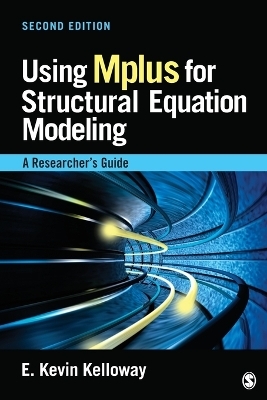
Using Mplus for Structural Equation Modeling
SAGE Publications Inc (Verlag)
978-1-4522-9147-5 (ISBN)
Ideal for researchers and graduate students in the social sciences who require knowledge of structural equation modeling techniques to answer substantive research questions, Using Mplus for Structural Equation Modeling provides a reader-friendly introduction to the major types of structural equation models implemented in the Mplus framework. This practical book, which updates author E. Kevin Kelloway’s 1998 book Using LISREL for Structural Equation Modeling, retains the successful five-step process employed in the earlier book, with a thorough update for use in the Mplus environment. Kelloway provides an overview of structural equation modeling techniques in Mplus, including the estimation of confirmatory factor analysis and observed variable path analysis. He also covers multilevel modeling for hypothesis testing in real life settings and offers an introduction to the extended capabilities of Mplus, such as exploratory structural equation modeling and estimation and testing of mediated relationships. A sample application with the source code, printout, and results is presented for each type of analysis.
E. Kevin Kelloway is the Canada Research Chair in Occupational Health Psychology at Saint Mary’s University. He received his PhD in Organizational Psychology from Queen’s University (Kingston, ON) and taught for eight years at the University of Guelph. In 1999 he moved to Saint Mary’s University where he also holds the position of Professor of Psychology. He was the founding director of the CN Centre for Occupational Health and Safety and the PhD program in Business Administration (Management). He was also a founding principal of the Centre for Leadership Excellence at Saint Mary’s. An active researcher, he is the author/editor of 12 books and over 100 research articles and chapters. He is a Fellow of the Association for Psychological Science, the Canadian Psychological Association and of the Society for Industrial/Organizational Psychology.
Chapter 1: Introduction
Why Structural Equation Modeling?
The Remainder of This Book
Chapter 2: Structural Equation Models: Theory and Development
The Process of Structural Equation Modeling
Chapter 3: Assessing Model Fit
Absolute Fit
Comparative Fit
Parsimonious Fit
Toward a Strategy for Assessing Model Fit
Chapter 4: Using MPlus
The Data File
The Command File
Putting It All Together: Some Basic Analyses
Chapter 5: Confirmatory Factor Analysis
Model Specification
Identification
Estimation
Assessment of Fit
Model Modification
Sample Results Section
Chapter 6: Observed Variable Path Analysis
Model Specification
Identification
Estimation
Mediation
Using Equality Constraints
Multisample Analysis
Chapter 7: Latent Variable Path Analysis
Model Specification
Sample Results
Chapter 8: Longitudinal Analysis
Measurement Equivalence Across Time
Latent Growth Curves
Cross-Lagged Models
Chapter 9: Multilevel Modeling
Multilevel Models in Mplus
Conditional Models
Random-Slope Models
Multilevel Modeling and Mediation
| Verlagsort | Thousand Oaks |
|---|---|
| Sprache | englisch |
| Maße | 152 x 228 mm |
| Gewicht | 370 g |
| Themenwelt | Mathematik / Informatik ► Mathematik ► Computerprogramme / Computeralgebra |
| Sozialwissenschaften ► Soziologie | |
| ISBN-10 | 1-4522-9147-0 / 1452291470 |
| ISBN-13 | 978-1-4522-9147-5 / 9781452291475 |
| Zustand | Neuware |
| Haben Sie eine Frage zum Produkt? |
aus dem Bereich


